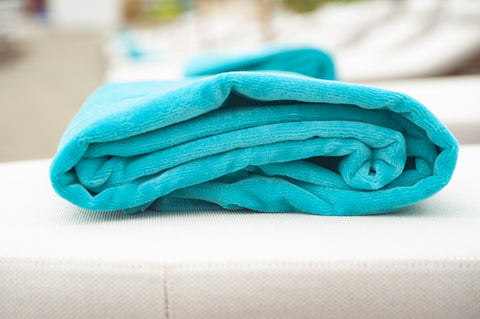
Bathing with Dignity: How Often Should Seniors Bathe?
Share
As we age, our bodies undergo various changes, and daily routines that were once second nature may become more challenging. One such routine that often presents difficulties for seniors and their caregivers alike is bathing and showering.
It's a fundamental aspect of personal hygiene and health maintenance, yet finding the right balance between cleanliness and comfort can be a delicate task. In this comprehensive guide, we'll explore the significance of bathing for seniors, discuss optimal bathing frequencies, and offer practical tips for ensuring that seniors maintain their dignity while staying clean and healthy.

Understanding the Importance of Bathing for Seniors
Personal hygiene, including regular bathing, is essential for individuals of all ages. Proper hygiene not only helps prevent infections and skin irritations but also contributes to overall well-being and self-esteem. However, for seniors, maintaining cleanliness takes on added significance due to age-related factors such as decreased mobility, thinning skin, and changes in sensory perception.
One of the primary concerns associated with bathing for seniors is the risk of skin breakdown and infections. As skin becomes thinner and more fragile with age, it becomes more susceptible to damage from bacteria, fungi, and other pathogens. Additionally, reduced circulation and slower wound healing further increase the risk of complications from skin-related issues. Therefore, establishing a regular bathing routine is crucial for preventing these problems and promoting skin health.
Furthermore, bathing offers psychological benefits for seniors by promoting relaxation, improving mood, and enhancing feelings of freshness and vitality. For many older adults, the act of bathing serves as a form of self-care and personal grooming, allowing them to maintain a sense of dignity and independence. However, it's essential to recognize that individual preferences and cultural norms may influence seniors' attitudes toward bathing, and respecting their autonomy in this regard is paramount.
Determining the Optimal Bathing Frequency for Seniors
One of the most common questions caregivers have regarding senior hygiene is how often their loved ones should bathe. While there is no one-size-fits-all answer to this question, several factors should be taken into account when determining the optimal bathing frequency for an elderly individual:
-
Skin condition: Seniors with dry or sensitive skin may benefit from less frequent bathing to avoid further irritation and moisture loss. Conversely, those prone to excessive sweating or skin infections may require more frequent bathing to maintain cleanliness and prevent odors. Take a minute to read this article from Health Hub, Skin Problems in the Elderly, to learn more.
-
Mobility and functional status: Seniors who have difficulty moving or transferring may find bathing to be physically challenging and may need assistance or modifications to their bathing routine. In such cases, sponge baths or bed baths may be suitable alternatives to traditional tub or shower baths.
-
Health conditions: Certain medical conditions, such as urinary or fecal incontinence, may necessitate more frequent bathing to manage hygiene and prevent skin breakdown. Additionally, individuals with compromised immune systems or chronic wounds may require special attention to avoid infections.
-
Personal preferences: Some seniors may have strong preferences regarding their bathing frequency, temperature, and bathing products. Caregivers should take these preferences into account and work collaboratively with their loved ones to develop a bathing routine that meets their needs and preferences.
Based on these considerations, most experts recommend bathing seniors at least once or twice a week to maintain cleanliness and prevent skin problems. However, individualized care plans should be developed based on the senior's unique circumstances and preferences.
Practical Tips for Bathing Seniors with Dignity
Ensuring that seniors maintain their dignity and autonomy during bathing is essential for preserving their sense of self-worth and well-being and is the driving force in our establishing Dignity Bath. Here are some practical tips for bathing seniors with dignity:
-
Respect privacy and modesty: Always provide seniors with privacy during bathing and respect their modesty by using our bath wrap for men or women. Use a shower curtain or screen to create a private bathing area and minimize exposure.
-
Encourage independence: Whenever possible, allow seniors to participate in their bathing routine by providing them with the necessary tools and assistance. This may include grab bars, shower chairs, handheld showerheads, and non-slip mats to enhance safety and independence.
-
Use gentle and skin-friendly products: Choose bathing products that are specifically formulated for seniors' delicate skin and free from harsh chemicals or fragrances that may cause irritation. Opt for mild cleansers, moisturizing body washes, and hypoallergenic shampoos to keep skin soft and hydrated.
-
Ensure comfort and safety: Make sure the bathing environment is comfortable and safe for seniors by adjusting the water temperature, lighting, and room temperature to their preferences. Use non-slip mats and grab bars in the bathtub or shower to prevent falls and accidents.
-
Communicate effectively: Maintain open and respectful communication with seniors during the bathing process, explaining each step and addressing any concerns or preferences they may have. Encourage them to express their needs and preferences regarding bathing frequency, water temperature, and bathing products.
By following these practical tips and guidelines, caregivers can help seniors maintain their dignity and independence while ensuring their cleanliness and hygiene.
Conclusion
Bathing is an essential aspect of personal hygiene and health maintenance for seniors, but finding the right balance between cleanliness and comfort can be challenging. By understanding the importance of bathing, determining the optimal bathing frequency, and implementing practical tips for bathing with dignity, caregivers can help seniors maintain their sense of self-worth and well-being while ensuring their cleanliness and hygiene. With compassion, patience, and respect for their autonomy, caregivers can support seniors in maintaining their dignity and independence throughout the aging process.
